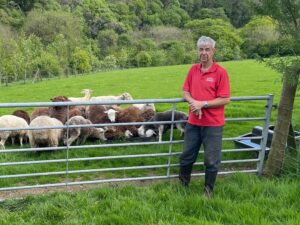
The Government will not water down food safety and animal welfare standards in the pursuit of trade deals after Brexit, according to Defra minister George Eustice.
Speaking at the CLA breakfast on the first day of the Royal Bath & West Show, Mr Eustice insisted that the Government would stand firm and set high standards for imported goods, to avoid undermining the British farming sector.
“We have standards that we will not abandon,” he said. Negotiating trade deals and import standards was common in countless other countries, and the UK had to get better at it after abdicating responsibility to the EU for the past 50 years, he added.
Rather than getting spooked by demands from other countries, the Government would set out the boundaries and then negotiations could begin in earnest. “I’m the first minister standing here for nearly half a century who’s actually able to change anything,” said Mr Eustice. “We now have the power to legislate any way we see fit.”
Mr Eustice also unveiled new details about how Defra was likely to implement the transition from the existing Single Farm Payment to the new land management scheme, having received 44,000 responses to the Health and Harmony consultation paper.
He suggested that the largest farmers would incur a cap on their single payment, and have the option to migrate over to pilot the new, uncapped scheme. The SFP cap would then progressively be reduced, with those farmers gradually migrating over to the new scheme. This would enable any glitches to be ironed out of the system, and also give the smallest farmers the greatest amount of time to prepare for change.
However, James Small, Somerset chairman of the NFU, r equested that any reduction should be proportionate across all farm sizes, and that smaller farmers be given the option to move to the new scheme early if desired – a point which Mr Eustice accepted.
Although some pundits had suggested that the Government was focusing too much on the environment and not enough on profitable food production, Mr Eustice disagreed. “Commercial farming and doing what is right for the environment are two sides of the same coin,” he said. To help farmers become more competitive and environmentally friendly, the Government would introduce grant schemes to help with slurry storage and application, for example.
He also insisted that the new scheme would be simpler to operate, with less red tape. “We can get rid of the insane bureaucracy of EU auditors. This is a real opportunity to deliver a culture change in regulation.”
In future, Mr Eustice foresaw a scheme without an annual application deadline, which would spread the workload for farmers and Defra alike. Payments could be made quarterly or monthly to spread cash flow, and farmers could see the return of a local RPA account manager, he explained. “We want to bring back more of a human touch to the way we approach schemes, with a presumption in favour of accepting that the farmer is doing the right thing.”
John Mortimer, south west director of the CLA, said it was important that any payments for public goods should be commercially viable, not simply income foregone as under existing environmental schemes. “It should be a business transaction, not a handout.” The CLA had published its proposed land management contract, which could help form the basis of new agreements. “The incentives to deliver must be right.”
• The Royal Bath & West Show will be held on 30 May – 2 June. Tickets are available from the website: http://www.bathandwest.com/royal-bath-and-west-show/visitors/tickets or by calling 0844 776 6777.




